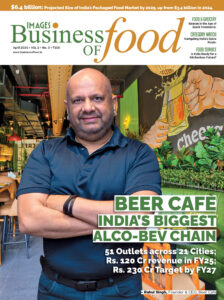The Good Food Institute India (GFI India) released its latest report, The Next Course: Reimagining Smart Protein: Insights from the Food Service Industry and Brands in the Plant-Based Meat Sector, in a closed-door gathering with representatives from various industry stakeholders like the National Restaurant Association of India (NRAI), McDonald’s, Tibbs Foods, Rebel Foods, ProMeat, Blue Tribe, Prot, GoodDot, Plantaway, Intercontinental and independent restaurants such as Mesa, Gracias Granny, Plural, among others. The report sheds light on the untapped potential of plant-based meats in India’s growing food service industry and provides actionable insights to drive adoption and collaboration across the sector.
The report underscores that despite the nascent stage of the plant-based meat market in India, India’s vibrant food service industry, projected to grow at a compound annual rate of 8.1% to reach INR 7.6 trillion by 2028, offers a unique avenue for accelerating the category’s growth. By leveraging the rising popularity of dining out, especially in organised segments such as casual dining and cloud kitchens, plant-based meat brands have the opportunity to position their products as indulgent and versatile menu options.
“The food service industry has always played a key role in introducing newer cuisines and ingredients to Indian households and holds immense potential to drive the adoption of plant-based proteins among consumers as well,” said Sneha Singh, Managing Director of GFI India. “India’s rich culinary heritage and dynamic dining out market make it uniquely positioned to lead a transformative shift in the way we eat and pave the way for a more sustainable and inclusive food ecosystem.”
The report highlights solutions aimed at overcoming key barriers to adoption identified through a qualitative study conducted with chefs, restaurateurs, marketers, plant-based brands, and other industry leaders. Some strategies for success to integrate plant-based meats into menus include prioritising taste and texture, addressing health and processing misconceptions through targeted education, and collaborating with chefs to create appealing recipes.
The report’s findings also emphasise the need to understand the chef’s vision and business needs, as well as the strategic advantage of integrating plant-based meat into regional cuisines and formats. The study further reveals that positioning plant-based meats as high-protein and indulgent resonates better with consumers than labels like vegan or meatless. Pranav Rungta, a seasoned hospitality leader and the Vice President of the National Restaurant Association of India (NRAI), added, “The real barrier is not the lack of awareness but the need for a mindset change. With the food service industry growing and becoming more organised, educated restaurateurs who understand the impact of health, nutrition, and alternative proteins are also growing. We are very enthused by this initiative by GFI India, with whom we have been in conversation to tap into this category.”
The event that saw attendance from many chefs, food and lifestyle pioneers, bloggers, and marketeers provided a platform to deliberate on the critical role of branding, positioning, and recipe development in popularising plant-based meat, highlighting their influence in driving curiosity and demand among Indian consumers. Besides the release of GFI India’s latest report, the extravagant culinary experience curated by GFI India, Earth Cafe, Chef Varun Sharma, utilising the products from brands such as Gooddot, Plantaway, Prot, Blue Tribe, Imagine Foods, Break of Dawn, Soft Spot, Evolved Foods, and Promeat was the focal point of the event. With meatless but delectable versions of Biryani, Bhurji, Sushi, Shawarma, Kebabs, grazing tables, and indulgent desserts, the evening made for a novel experience for the audience.Plant-based meat brands also got a unique opportunity to explore best practices for collaboration, including tailoring pitches to align with different establishment’s unique brand identities, co-creating recipes with chefs, overcoming pricing and payment barriers, and most importantly, prioritising taste and texture to deliver superior consumer experiences. Romil Ratra, Executive Director and CEO at Graviss Hospitality as well as the co-founder of plant-based brand Plantaway, said, “Plant-based brands have to look at themselves not as product suppliers but as solutions providers. Brands and food service businesses both have their own unique visions, and decisions on these partnerships often come down to price.” The event showcased the need for a unified effort to reshape perceptions and integrate plant-based options into mainstream dining, fostering a more sustainable and inclusive food system.




